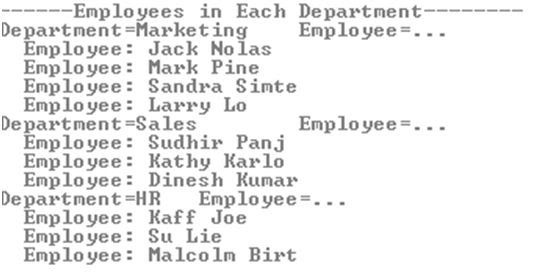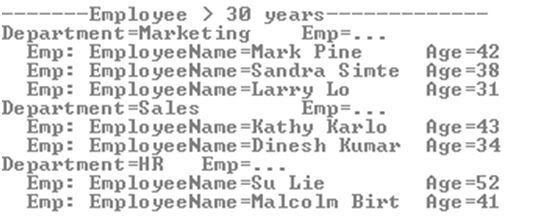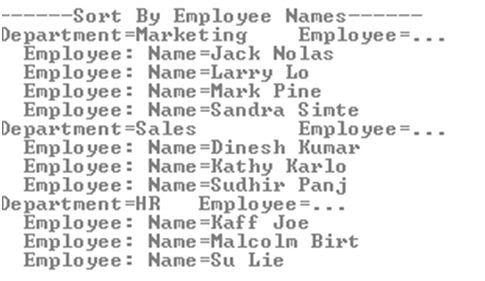using System;
using System.Collections;
using System.ComponentModel;
using System.Data;
using System.Drawing;
using System.Text;
using System.Windows.Forms;
namespace FirstLastDay
{
/// <summary>
/// Example of one approach to obtaining the
/// first and last days of any given month
/// </summary>
public partial class frmFirstAndLast : Form
{
The
constructor is shown following the namespace and class declarations; it
has been modified to load an array containing a list of all of the
months into a ComboBox and to set the control to display the first item in its collection upon initialization.
#region Constructor
/// <summary>
/// Constructor
/// </summary>
public frmFirstAndLast()
{
InitializeComponent();
// creat an array of all of the months
string[] months = {"January", "February", "March", "April",
"May", "June", "July",
"August", "September", "October", "November", "December"};
// populate a combobox with all of the months
cboMonths.Items.AddRange(months);
// select an item
cboMonths.SelectedIndex = 0;
}
#endregion
The
click event handlers region follows; this section actually calls the
class methods used to retrieve the first and last of the month date
values and in turn displays that information to the user. The annotation describes the code.
#region Click Event Handlers
/// <summary>
/// Find and display the first and last day of the month for
/// the supplied date
/// </summary>
/// <param name="sender"></param>
/// <param name="e"></param>
private void btnFind_Click(object sender, EventArgs e)
{
// set the calendar date and click the find button to report
// the first and last day of the month for any month selected
// in the date time picker control
//
// set first day
txtFirstDay.Text =
GetFirstDayOfMonth(dtpDate.Value).ToShortDateString();
// get day of week for first day
string[] dateParts = txtFirstDay.Text.Split('/');
DateTime dtFirstTemp = new
DateTime(Convert.ToInt32(dateParts[2]),
Convert.ToInt32(dateParts[0]),
Convert.ToInt32(dateParts[1]));
// display day of week in label
lblDowFirst1.Text = dtFirstTemp.DayOfWeek.ToString();
// set last day
txtLastDay.Text =
GetLastDayOfMonth(dtpDate.Value).ToShortDateString();
// get day of week for last day
string[] dateParts2 = txtLastDay.Text.Split('/');
DateTime dtLastTemp = new
DateTime(Convert.ToInt32(dateParts2[2]),
Convert.ToInt32(dateParts2[0]),
Convert.ToInt32(dateParts2[1]));
// display day of week in label
lblDowLast1.Text = dtLastTemp.DayOfWeek.ToString();
}
/// <summary>
/// Execute the code to set the first and last day of the month
/// by passing in only an integer representation of the month
/// </summary>
/// <param name="sender"></param>
/// <param name="e"></param>
private void btnFind2_Click(object sender, EventArgs e)
{
// set the calendar date and click the find button to report
// the first and last day of the month for any month selected
// in the date time picker control
//
// set first day
txtFirstDay2.Text = GetFirstDayOfMonth(cboMonths.SelectedIndex +
1).ToShortDateString();
// get day of week for first day
string[] dateParts = txtFirstDay2.Text.Split('/');
DateTime dtFirstTemp = new
DateTime(Convert.ToInt32(dateParts[2]),
Convert.ToInt32(dateParts[0]),
Convert.ToInt32(dateParts[1]));
// display day of week in label
lblDowFirst2.Text = dtFirstTemp.DayOfWeek.ToString();
//
// set last day
txtLastDay2.Text = GetLastDayOfMonth(cboMonths.SelectedIndex +
1).ToShortDateString();
// get day of week for last day
string[] dateParts2 = txtLastDay2.Text.Split('/');
DateTime dtLastTemp = new
DateTime(Convert.ToInt32(dateParts2[2]),
Convert.ToInt32(dateParts2[0]),
Convert.ToInt32(dateParts2[1]));
// display day of week in label
lblDowLast2.Text = dtLastTemp.DayOfWeek.ToString();
DateTime dt = new DateTime(dtpDate.Value.Year,
dtpDate.Value.Month, 1);
}
/// <summary>
/// Exit the Application
/// </summary>
/// <param name="sender"></param>
/// <param name="e"></param>
private void btnExit_Click(object sender, EventArgs e)
{
this.Dispose();
}
#endregion
The last region in the class contains the methods used to get the first and last days of the month. The
region provides four methods, one gets the first day of the month based
upon receipt of a date, one gets the first day of the month based upon
receipt of an integer value representing a month, one gets the last day
of the month based upon receipt of a date, one gets the last day of the
month based upon receipt of an integer value representing a month. The annotation describes the process used in each method.
#region Private Methods
/// <summary>
/// Get the first day of the month for
/// any full date submitted
/// </summary>
/// <param name="dtDate"></param>
/// <returns></returns>
private DateTime GetFirstDayOfMonth(DateTime dtDate)
{
// set return value to the first day of the month
// for any date passed in to the method
// create a datetime variable set to the passed in date
DateTime dtFrom = dtDate;
// remove all of the days in the month
// except the first day and set the
// variable to hold that date
dtFrom = dtFrom.AddDays(-(dtFrom.Day - 1));
// return the first day of the month
return dtFrom;
}
/// <summary>
/// Get the first day of the month for a
/// month passed by it's integer value
/// </summary>
/// <param name="iMonth"></param>
/// <returns></returns>
private DateTime GetFirstDayOfMonth(int iMonth)
{
// set return value to the last day of the month
// for any date passed in to the method
// create a datetime variable set to the passed in date
DateTime dtFrom = new DateTime(DateTime.Now.Year, iMonth, 1);
// remove all of the days in the month
// except the first day and set the
// variable to hold that date
dtFrom = dtFrom.AddDays(-(dtFrom.Day - 1));
// return the first day of the month
return dtFrom;
}
/// <summary>
/// Get the last day of the month for any
/// full date
/// </summary>
/// <param name="dtDate"></param>
/// <returns></returns>
private DateTime GetLastDayOfMonth(DateTime dtDate)
{
// set return value to the last day of the month
// for any date passed in to the method
// create a datetime variable set to the passed in date
DateTime dtTo = dtDate;
// overshoot the date by a month
dtTo = dtTo.AddMonths(1);
// remove all of the days in the next month
// to get bumped down to the last day of the
// previous month
dtTo = dtTo.AddDays(-(dtTo.Day));
// return the last day of the month
return dtTo;
}
/// <summary>
/// Get the last day of a month expressed by it's
/// integer value
/// </summary>
/// <param name="iMonth"></param>
/// <returns></returns>
private DateTime GetLastDayOfMonth(int iMonth)
{
// set return value to the last day of the month
// for any date passed in to the method
// create a datetime variable set to the passed in date
DateTime dtTo = new DateTime(DateTime.Now.Year, iMonth, 1);
// overshoot the date by a month
dtTo = dtTo.AddMonths(1);
// remove all of the days in the next month
// to get bumped down to the last day of the
// previous month
dtTo = dtTo.AddDays(-(dtTo.Day));
// return the last day of the month
return dtTo;
}
#endregion
}
}




